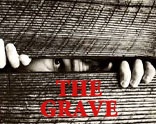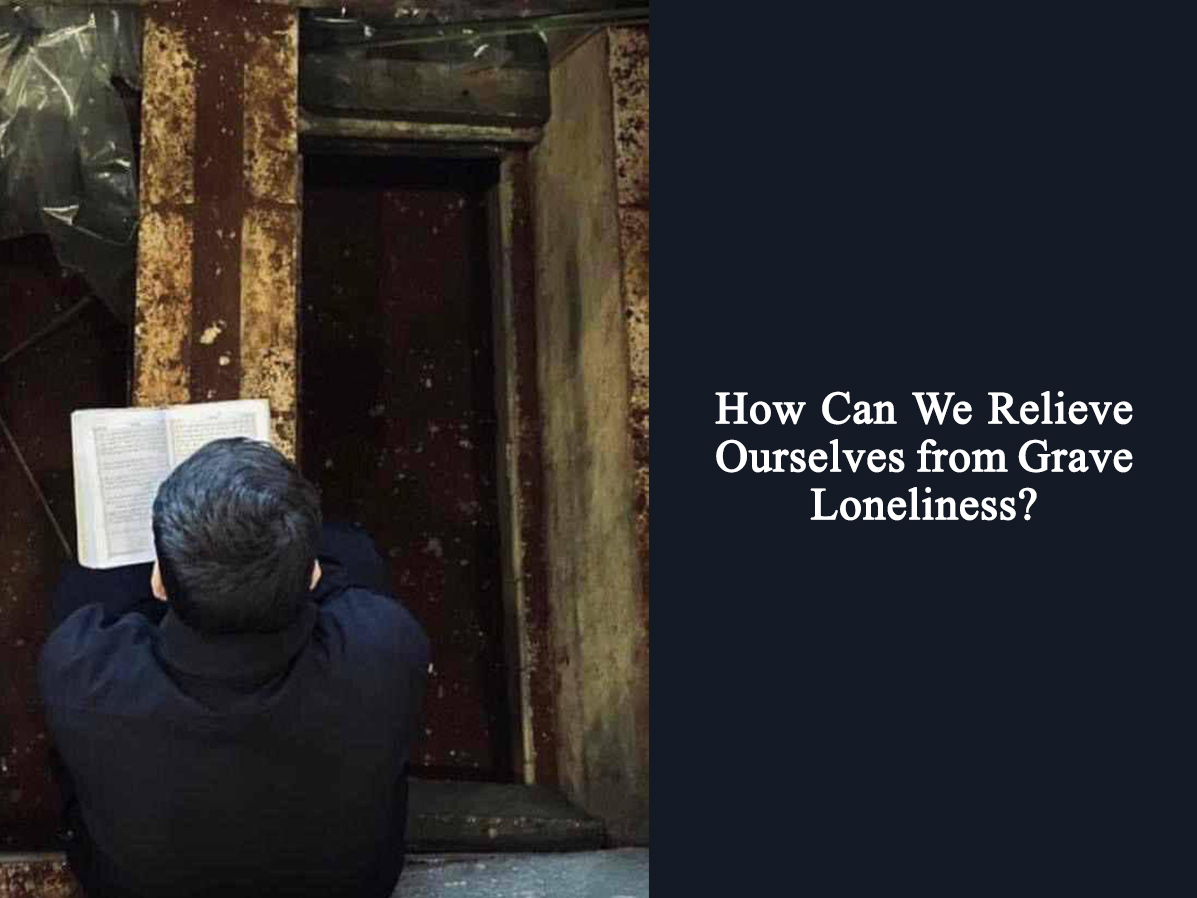THE GRAVE (QABR)
Death & Purgatory
One of the fearsome stages of the Hereafter is the grave, which calls out daily: "I am the abode of loneliness, I am the house of terror, I am the home of worms".
Terror of the Grave
It is quoted in Man La Yahzaruhul Faqih, that when a dead body is brought for burial, it should not be buried immediately. For there is no doubt that the terror of the grave horrifies the dead person, and he seeks refuge from Allah's wrath. The dead body should be laid to rest for sometime far from the grave, so that it prepares itself, and gets accustomed to it. Again one should stop and then take it to the grave. Allamah Majlisi, while commenting on the above, says that even though the spirit is separated from the body, it still maintains relation with it, and remains somewhat attached to it. The darkness and loneliness, questioning by 'Munkir and Nakeer', Squeezing in the grave (Fishar), and the chastisement in hell are some of the frightful stages. Hence it is necessary for man to take lessons from a dead man's state, and reflect upon it, because one day he himself will have to pass through these stages. Yunus narrates that one day he asked Imam Moosa al-Kazim (A.S.) that, "Whenever I think about the door of a house, the house becomes narrow in my sight, why is it so?" Imam (A.S.) replied, "It is so because whenever you take a dead body for burial, you should lay it to rest for sometime near the grave, so that the dead person may ready itself to enter there in, and collect strength to answer the questions of 'Munkir' and Nakir"'.
Bara bin Azib, one of the companions (Ashab) of the Holy Prophet (peace be upon him and his household) says that one day I was in the presence of the Prophet, when we saw a group of people gathered. The Holy Prophet (peace be upon him and his household) asked them as to why they had gathered? They replied that they had gathered to dig a grave. As soon as the Prophet heard the name of the grave, he hurried towards it and sat on one side of the grave. I sat on the other side facing him so as to get a clear view of what he did. I saw that the Prophet (peace be upon him and his household) started weeping bitterly so much that his face became wet, then he looked at us and said, "O my brothers! Prepare yourselves for this house".
Shaikh Bahai says that at times he saw many kings and rulers regretting their sins and wailing over their lives while dying. The Shaikh asked one such person who was about to die as to what was the reason for such regret. The dying king replied, "What do you have to say about the person who is proceeding for a journey without having gathered any provisions for it, and devoid of a helpful companion. He is stopped on the way in a horrifying grave, to be produced later before the Almighty Ruler, without having any goodness in store".
Allamah Qutubuddin Rawandi says that after the death of Hazrat Maryam (A.S.), her son Prophet Isa (A.S.) called her, "O mother! Please speak to me, and tell me whether you are desirous of returning back to this world". Hazrat Maryam (A.S.) answered, "Yes, I desire to return back, so that during the cold winter nights I could recite Namaz, and during the hot summer days I could fast. 0 my dear! Verily the way to the hereafter is very difficult."
It is narrated that when the last moments of Hazrat Fatima (A.S.) nearby, She called Amirul Momineen Ali (A.S.) and said, "When I die, you bathe me, shroud me, pray Namaz over my dead body, and bury me. When you do so, sit near my grave for sometime and recite the Holy Qur'an, and pray for my forgiveness. For verily after death the dead person relies totally on the prayers (dua's) and affection of the living ones' '.
When Hazrat Fatima binte Asad (the mother of Hazrat Ali) died, Amirul Mo'meneen (A.S.) came weeping to the Holy Prophet (peace be upon him and his household) and gave Him the news of her death. The Prophet was grieved and said, "My mother has died". History bears witness that she had brought up the Prophet affectionately like a mother. The Prophet (peace be upon him and his household) gave her his own gown for the shroud (Kafan), and Himself lay in the grave for sometime before burying her. After burying her, he stood near the grave and called out: "Your son, your son, not Aqeel, nor Ja'far ''. People were surprised and asked him the reason for uttering these words. The Holy Prophet (peace be upon him and his household) replied that, "One day we were discussing Qiyamah, and I said that on that day people will be coming out of their graves in a state of nakedness. My aunt (Fatima binte Asad) started crying, so I assured her that I would give her my own gown for the shroud, so she would not have to face that humiliation. She was scared of the squeeze in the grave (Fishar Qabr), so I lay myself in her grave so as to save her from this too. After burying her, Munkir & Nakeer came to question her. They asked her about her Lord, she replied that Almighty Allah was her Lord. Then they asked her about Prophet hood (Nubuwwah), she bore testimony that I was Allah's Apostle. But when they questioned her about her Imam, she was a bit confused. Hence I called out to her that "Your son, your son, not Aqeel nor Ja'far (but Ali)". Fatima binte Asad was a distinguished lady, who had the honor of giving birth to a son like Ali (A.S.), and herself remaining in the Ka'bah for three days as Allah's guest. She was the second woman who accepted the Prophethood of the Holy Prophet (peace be upon him and his household) the first being Hazrat Khadija (A.S.) even then she was fearful of the hereafter and wept. And we being sinful have forgotten our end, and do not take account of our deeds, but are averse to the terror of the hereafter.
Sayyed ibn Tawoos relates from the Holy Prophet (peace be upon him and his household) that he said that the first night is the most fearful and difficult for the dead person, hence give Sadaqa for his safety. If you do not have to give anything as 'Sadqa' then recite two unit (Rak'at) Namaz: In the first Rakat after Surah-al-Hamd recite twice Surah-at-Tawheed, and in the second Rakat after Surah-al-Hamd recite ten times Surah-at-Takasur. After finishing the Namaz recite the following dua:
Peace be upon Mohammad and his household and send its reward to the grave of...
(here take the name of the dead man)
Allah will immediately send one thousand Angels to the grave of the dead person with attires of Paradise, and expand his grave till Qayamat. And for the one who recites this Namaz, Allah will offer him great rewards and exalt his position forty times.
The other Namaz to be recited on the first night of burial is as follows: Two Rakat Namaz is to be recited, in the first Rakat after Surah-al-Hamd recite once Ayatul Kursi, and in the second Rakat after Surah-al-Hamd recite ten times surah-al-Qadr. After finishing Namaz say:
Peace be upon Mohammad and his household and send its reward to the grave of...
(here take the name of the deceased person).
My teacher Allamah Mirza Husain Noori (may Allah exalt his position) quotes in his book Darussalam from his teacher Haj Fateh Ali Sultanabadi that he said: It was my routine that whenever I heard about the death of follower (Shi'ah) of Ahlulbait (A.S.), whether known or unknown to me, I recited (the above stated) Namaz, and this was not known to anyone else except myself. One day I met one of my friends who told me that the previous night he saw in a dream a Shi'ah who had died some days ago. My friend asked him how his state was. He replied that he was in deep trouble facing the consequences of his deeds, till one so and so (he took my name) person recited Namaz for him. He said that, "May Allah bless his father, he rescued me from severe chastisement". My friend asked me about Namaz and I had to tell him.
Those deeds which are beneficial for warding off fear of the Grave.
One of them is performing Ruku with the entire recitation. Imam Mohammad-al-Baqir (A.S.) says that a person reciting the entire recitation of Ruku' in Namaz will be saved from the fear of the grave. And one who recites.
La Illah Illa Allah Al-Malik Ulhak Ul-Mobeen
100 times daily, will be saved from anxiety in the grave, will become prosperous, and the doors of Paradise will be opened for him. It is also related that the person who recites Surah-al-Yaseen before going to bed, and the following Namaz (Namaze Lay latur Raghaib), he will be saved from the terror of the grave. The first night of the month of Rajab is known as Laylatur Raghaib.
The Holy Prophet Mohammad (peace be upon him and his household) used to fast on the first Thursday of the month of Rajab, and between Maghrib and Isha Prayers recite twelve Rakat Namaz (in Si sets of two units) as under:
In every Rakat after Surah-al-Hamd recites three times Surah-al-Qadr and twelve times Surah-an-Naas. After Salaam recite seventy times:
peace be upon Mohammad and his household
Then go into prostration (Sajdah) and say seventy times:
Sobooh kodoos Rab lmalaeka warooh
Then sit erect and say seventy times:
Rabbighfir warham watajawaz amaa taelam, enaaka anta alaley al-aezam
Then again go into Sajdah and say seventy times:
Sobooh kodoos Rab lmalaeka warooh
It has been related that a person who fasts for twelve days in the month of Sha'ban, Allah will send seventy thousand Angels daily to his grave. And if a person visits an ailing man, Allah appoints an Angel for him who accompanies him in his grave till Qayamat.
Abu Sa'eed Khudri says that he heard the Holy Prophet (peace be upon him and his household) telling Amirul Momineen Ali (A.S.), "O Ali! Give glad tidings to your Shiats that their death will be eased, and they will be saved from the terror of the grave and Qiyamah".
Narrowness of and Squeeze in the Grave (Fishar Qabr)
This event is so horrifying, that it makes a person shiver with fright in this very world. Amirul Momineen Ali (A.S.) says: "O the servants of Allah! The state in the grave of a person whose sins are not forgiven is more horrifying than death itself. Fear it's (grave's) narrowness, it's squeezing, it's imprisonment, and it's loneliness. Verily the grave calls out daily: I am the house of loneliness, of terror and worms. Grave is like a garden of Paradise for a good doer, while it is like a dungeon of hell for the evil doer. Allah tells His enemies that He will send ninety nine serpents in their graves, who will tear their flesh and smash their bones, and this punishment will continue till the outbreak of Qayamat. if one of the serpents exhales toward this earth, all plants and trees will be destroyed. O servants of Allah! Your souls are tender, and your bodies delicate, you cannot confront any ordinary serpent of this world, how then will you face them".
Reasons for the Squeeze in the Grave
Laziness in purifying oneself after urinating, creating mischief amongst people, backbiting (ghibat), and severing relations with kith & kin are some of the reasons for this punishment.
Sa'ad bin Ma'az was one of the noble men of Ansars.He was held dear by the Holy Prophet (S.A.W.S) Himself and His companions, to the extent that whenever he came to meet the Prophet, He used to instruct His companions to welcome him with honor. The Prophet Himself stood up to welcome him. Sa'ad was wounded in a battle fought against the Jews of Qurayza, and later succumbed to the injuries. When he died, seventy thousand Angels attended his funeral. The Holy Prophet (peace be upon him and his household) was present bare feet till the end, and gave shoulder to his bier, and said that the Angels had come to recite the funeral prayers (Namaze Mayyit), and Jibraeel and Mikaeel were also present alongside him. The Holy prophet loved him so much that He Himself buried him. Seeing these, the mother of Sa'ad remarked, "O my son, rejoice at the attainment of Paradise". The holy Prophet (peace be upon him and his household) says that, if a believer (Mo'min) does not help his believer brother even after having capacity to do so, Allah will send a large serpent named Ajar in his grave, who will keep biting at his fingers". In another narration it is stated that the serpent will keep on biting his fingers even though his sin will have been forgiven.
Do people who are drowned or are hanged have to face the Squeeze in the Grave?
Shaikh Kulaini narrates from Yunus who says that once Imam Ali-ar-Reza (A.S.) was asked whether a person who is hanged also faces squeezing. (In the olden days it was a custom that when a person was hanged, his body was not brought down from the gallows, but was kept hanging there. As in the case of Zaid bin Ali bin Hussein (A.S.), he lay in that manner for three years). Imam Reza (A.S.) answered, "Yes, they too shall face it, because Allah (who has power over all things) orders the wind to squeeze him as the earth does". Imam Ja'far-as-Sadiq (A.S.) says that, "Verily the Lord of the earth and the wind is One and the same, He commands the wind to squeeze the dead man, and this squeezing is more painful than the squeezing by the earth". In the same manner those who are drowned or are killed and eaten up by the beasts have to face the squeezing. Not offering thanks to Allah for His blessings and denying them, is also one of the causes of the squeeze in the grave (Fisbare Qabr).
Those A'mal which saves one from the Squeeze in the Grave.
There are many acts (A'amal) to save one from the squeeze in the grave, but for brevity's sake, I state here only seventeen of them.
1- Amirul Momineen Ali (A.S.) says that a person who recites Surah-an-Nisa on every Friday will remain safe from the squeeze in the grave.
2- It is narrated that if a person recites Surah-az- Zukhruf, Allah will save him from the reptiles of the earth, and the squeeze in the grave.
3- A person who recites Surah-al-Qalam in Obligatory Prayers (Wajib Namaz) or Supererogatory Prayers (Nafela), will remain safe from this punishment.
4- Imam Ja'far-as-Sadiq (A.S.) says that if a person dies between the sunset of Thursday and the sunset of Friday, Allah will exempt him from this punishment.
5- Imam Ali-ar-Reza (A.S.) says that the Midnight Prayers (Namaze Shab) is recommended (sunnat) for you. So if a person gets up in the last part of the night and recites Namaze Shab, Allah will save him from the squeeze in the grave and grant him immunity from the fire of hell, and will increase his age and sustenance.
6- The Holy Prophet (peace be upon him and his household) says that if a person recites Surah-at-Takasur before going to bed, Allah will grant him freedom from this punishment.
7- If a person recites this supplication (dua') ten times daily will be saved from this punishment. (The du'a has already been quoted in Chapter - I under "Those A'mal which prove beneficial during death and eases its tribulations").
8- A person who is buried in Najafe Ashraf. Because the earth of that place has got the specialty, that a person buried there will be saved from the punishment in the grave, and will be exempted from the questioning by Munkir and Nakeer.
9- To put Jareedatayn (two wet sticks or branches) along with the dead body in the grave. It is narrated that so long as the sticks remain wet, the dead person is saved from chastisement. It is related that once the Holy Prophet (peace be upon him and his household) was passing by a grave on which Allah's wrath was descending. He called for a leafless branch. He cut it from between, wetted it with water, and kept one on the head of the grave and the other on the feet. It is also related that to sprinkle water on the grave is also beneficial, for so long as the mud of the grave remains wet, the dead person remains safe from the punishment in the grave.
10- A person who recites ten units (Rak'at) of Namaz on the 1st of Rajab such that in every Rakat after Surah-al-Hamd recites three times Surah-at-Tawheed, will be saved from the squeeze in the grave. To recite twenty Rakat Namaz on the night of 1st Rajab, such that in every Rakat after Surah-al-Hamd recite one Surah-at-Tawheed is beneficial to save oneself from the punishment in the grave.
11- To fast for four days in the month of Rajab or twelve days in the month of Sha'ban is also beneficial.
12- To recite Surah-al-Mulk on the grave is an act which saves the dead man from the punishment in the grave. Allamah Qutubuddin Rawandi relates from Ibne Abbas, who says that once a person pitched a tent on a ground not knowing that there was a grave beneath. Thereafter he started reciting Surah-al-Mulk. Suddenly he heard a voice saying that the Surah gives salvation. He related this incident to the Holy Prophet (peace be upon him and his household), who replied that, "Verily this Surah frees a person from the punishment in the grave". Shaikh Kulanini also narrates from Imam Mohammad-al-Baqir (A.S.) who said that the recitation of Surah-al-Mulk saves one from the punishment in the grave.
13- It is related from the Holy Prophet (peace be upon him and his household) in "Dawaat" of Allamah Qutubuddin Rawandi that, when a person is being buried and someone recites this supplication (du'a) thrice, the corpse will remain safe from the punishment in the grave till the day of Qayamat:
14- Shaikh Toosi in his Misbahul Mutahajjid' relates the Holy Prophet (peace be upon him and his household) as saying that, if a person recites the following two Rakat Namaz on friday night, Allah will free him from the punishment in the grave, and save him from fear on the day of Qayamat. In each Rakat after Surah- al-Hamd recites fifteen times Surah-az-Zilzal.
15- To recite thirty Rakat Namaz in the middle part of the month of Rajab, such that in each Rakat after Surah-al- Hamd recites ten times Surah-al-Tawheed is beneficial to ward off punishment in the grave. In the same manner, reciting the above Namaz on the night of 16th and 17th Rajab and the 1st of Sha'ban is also beneficial. On the night of the 1st of Sha'ban to recite 100 Rakat Namaz, such that in each Rakat after Surah-al-Hamd recite one Surah-at Tawheed, after ending the Namaz recite fifty times Surah at-Tawheed. On the night of 24th Sha'ban recites one hundred Rakat Namaz, such that in each Rakat after Surah-al-Hamd recites ten times Surah-an-Nasr. Also to recite fifty Rakat Namaz such that in each Rakat after Surah-al-Hamd recite fifty times Surah-at-Tawheed, fifty times Surah-al-Falaq, and 50 times Surah-an-Naas saves one from the punishment in the grave. To recite the same Namaz on the night of Ashura' (10th of Muharram) is also beneficial.
16- To keep Khake Shifa' (the mud of the grave of Imam Hussein ( A.S.) in the shroud (kafan), or to rub it on the parts of prostration (Sajdah).
17- It is narrated from Imam Ja'far-as-Sadiq (A.S.) in "Anware Numaniyah" that if forty persons gather near the body and recite:
Al-ahouma ena la naelam menho khayran wanta aelam behe menna fagfer laho
Allah will safeguard the dead man from the punishment in the grave.
It is related from Imam Ja'far-as-Sadiq (A.S.) that there was a virtuous man in Bani Israil, regarding whom it was revealed to Prophet Dawood (A.S.) that he was a hypocrite (riyakar) When he died, Hazrat Dawood refrained from attending his funeral But forty other people attended his funeral and said:
Alahoma ena la naelam ella khayran waanta aelam behe menna faghfer laho
Then another forty came and repeated the same, for they were not aware of the hidden reality. Allah then revealed to Dawood (A.S.) and asked him as to why he did not attend his funeral. Hazrat Dawood answered, "O Lord! You said that the man was a hypocrite, and so I avoided his funeral". Allah said, "Verily it was true, but because forty persons bore witness to his goodness I forgave his sins". It is Allah's mercy and beneficence who thus forgave His servant with any trial or tribulation.
It is for this reason that the believers (mo'meneen) in the olden days kept their shrouds (kafan) with them, and would request other believers to write down their testimonies on it The sight of the shroud made them remember death and increase the fear of the hereafter. We too should follow this example and request other Mu'mineen to write down their testimonies on our shrouds, and preserve it with us, so that we are always reminded of the hereafter
Questioning in the Grave by Munkir and Nakeer
One of the principal factors of Shi'ism, belief in which is obligatory (wajib), is the questioning in the grave by Munkir and Nakeer. Allamah Majlisi relates in 'Biharul Anwar' and Haqqul Yaqeen' that it is a proven fact from reliable traditions that the questioning and the squeezing in the grave is for the physical body, as also for the spirit. In the grave one is questioned regarding one's beliefs (Aqaid) and deeds (A'maal). The questions are put to every believer as well as a non-believer. Only infants, the mentally retarded, and the people of lesser intellect are exempted from it. The period of Barzakh' offers them neither reward nor retribution.
One is questioned about the Prayers (Namaz), Fasting (Siyam), the Pilgrimage (Haj), Zakat, Khums, love of Ahlulbayt (A.S.), and also about how he spent his entire life and wealth. Imam Ali Zainul Abedeen (A.S.) says that after questioning about the beliefs of Islam, a person is questioned about how he spent his life, and also about the way he earned his wealth and spent it.
There are many whose tongues would cease to answer the questions put forth to them, and would not be able to answer, or would reply wrongly. It also happens that in reply to the question "Who is your Lord?", the person will reply to the Angels that they (i.e the Angels) are his lord. The person who is well acquainted in his lifetime with the beliefs and principals (of Islam) will be able to answer without trouble. And if he does so, his grave will be broadened to the length his sight reaches. The period of Barzakh' passes away easily with Allah's blessings, and the Angels proclaim to him: "Sleep thou like a newly wedded bride". (Usoole Kafi) If the dead man is a non believer or a hypocrite, and cannot answer the questions put forth to him, one of the doors of hell is opened in his grave, and the entire grave is filled with the raging-fire. As Allah says in the Quran: ﴾And if he be of those who have belied, gone astray, He shall have an entertainment of a boiling water, And the boiling in the hell -fire﴿ (surah -al Waqiah: 92-94). Imam Ja'far-as-Sadiq (A.S.) says that, "A person who denies the following, is not one of our Shiats: (1) Ascension (Me'raj of the Holy Prophet), (2) Questioning in the grave, and (3) Our Intercession (Shafa'at).
It is related that two Angels having a fearful countenance enter the grave for questioning, their voices are like thunder, and their eyes like lightning. They put forth the following questions:
1- Who is your Lord?
2- Who is your Prophet?
3- What is your Religion?
4- Who is your Imam?
The dead man feels uneasy in answering these questions because of the fearful environment and needs help at that moment, hence Talqeen is recited at the following two places so that he is reminded of his beliefs (Aqaid). (1) When the body is laid in the grave. It is better to place one's right hand on the right shoulder of the dead body, and the left hand on the left shoulder, and shake slightly when the name of the dead man is recited in the Talqeen'. (2) When the grave Is closed. It is recommended (sunnat) that a near relative of the dead man should sit near the head of the grave after people leave, and should recite the Talqeen' in a loud voice. It is better to place one's palms on the grave and take one's face near the grave while reciting. There is no problem if another person other than the relatives is deputed for it. It is related that when the Talqeen' is recited, and the Angels (Munkir & Nakeer) hear it, Munkir tell Nakeer, "Come let us leave, for the Talqeen is a proof of his beliefs, and there remains no ground for further questioning".
* Manazil Al-Akhira. By SHAIKH ABBAS BIN MOHAMMAD REZA AI-QUM. Chapter 2. Published in Iran, Qum.




















